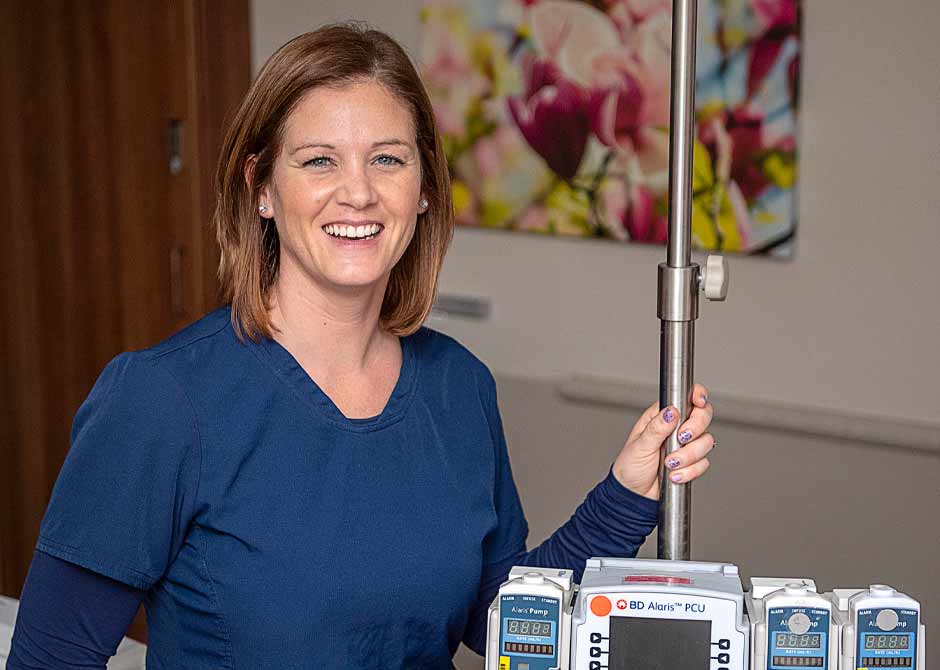 The difference between being connected and making connections may sound like semantics, but it isn’t lost on Margaret Good, a registered nurse who works on 9 East Rhodes.
The difference between being connected and making connections may sound like semantics, but it isn’t lost on Margaret Good, a registered nurse who works on 9 East Rhodes.
The 2019 Excellence in Service Award winner is known for refraining from using her cellphone at work. In fact, she rarely carries it.
“This subtle act, while seemingly small, evokes high levels of admiration from her peers,” says Tina Welch, a staff nurse who works with Good.
“She is not kidding when she says her attention belongs to her patients while she is at work. She wants no distractions from being able to sit and connect, to hear someone’s story, pay attention to labs or signs and symptoms of a patient, help a co-worker in need, smile at a visitor when giving directions, advocating for a patient to a physician. The list goes on and on.
“She has said that when she gets off the elevator that it’s ‘game on’ and her mentality shifts to being all about her patients and their care,” Welch says. “Complementing that, she somehow finds the time to be extraordinarily supportive of her co-workers.
“Her ability to show compassion, professionalism and then to back all that up with a strong knowledge base of information is amazing.”
Tell us a little about yourself.
I graduated as an LPN in 2007, then in 2008 as an RN from Hocking College. I became a hospice case manager and worked for Fairhope Hospice and Palliative Care for three years. I came to The Ohio State University Wexner Medical Center in 2012 and have been here ever since!
Where are you from, and what led you to Ohio State?
I live in Logan and was working in Lancaster when I made the change to come to the Wexner Medical Center. I was initially drawn here by a few of my friends who worked on this unit. They spoke so highly of Ohio State and its awesome interdisciplinary approach. I had to check it out.
What drew you to the field and the role you play at the medical center?
I have always wanted to be a nurse. Even from a young age, I had the desire to take care of sick people and help them feel better. Bedside nursing is my passion. I enjoy getting to know my patients, holding their hand during the difficult times and maybe making them laugh a little. To me, there is nothing more rewarding. I also love education on a one-on-one basis. I provide peer education on our unit and I find that it not only helps educate my peers, but helps further my own education as well.
Where do you work and what type of patients do you work with?
I work on 9 East Rhodes, where hepatology is our specialty. These are patients with liver disease in various stages. We also have general medicine patients.
You have a reputation among your peers for hitting the ground running when your shift begins. Do you do anything special to put yourself in the right frame of mind?
I always say a prayer before I come into work. I pray that I provide great care to my patients and that I am kind to the people I come in contact with. When I start my shift, my patients are my #1 priority. I am all business at work.
Tell us a little about how you became involved with trauma informed care.
One of my colleagues attended a trauma informed care conference a couple of years ago. She was so passionate about this subject that she came back to the unit and educated us on what she had learned. With my manager and colleagues’ support, I was able to become a trauma informed care trainer.
What’s the most important aspect of your job?
I would say the most important aspect of my job is simple: Just help someone in need. Whether that be a patient who needs you to stay with them an extra five minutes or a co-worker who needs emotional support, I believe I was put on this earth to be available to help.
Which of the medical center’s core values do you most identify with and why?
I feel I most identify with the core value of empathy. As a former hospice nurse, I learned so much during that time of interaction with patients going through really difficult times. It taught me to put the needs of others first. The patients that I come in contact with on a daily basis need to have their feelings acknowledged. I try to make sure my patients know that how they are feeling is a priority to me.
What’s the most challenging part of your job? What’s the most rewarding part?
The most challenging part of my job is sometimes caring for the patient more than they care for themselves. When you can see what a patient needs to do to better their lives but they simply refuse to help themselves, that can be very draining mentally.
On the flip side, the most rewarding part of my job is helping liver patients get prepared to receive a liver transplant. It is so exciting! All that hard work, from the patient, their families and staff, makes it absolutely worth it when you get that call that a liver is available.
What else should we know about you?
I have a wonderful husband, an almost six-year-old son and twin four-year-old girls whom I adore! We live in the beautiful Hocking Hills and love every minute of it.
